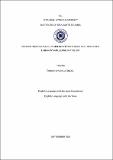Bu öğeden alıntı yapmak, öğeye bağlanmak için bu tanımlayıcıyı kullanınız:
http://hdl.handle.net/11547/7384| Başlık: | DEFIANT MEDUSA GAZE IN GILLIAN FLYNN’S GONE GIRL AND STIEG LARSSON’S MILLENNIUM TRILOGY |
| Yazarlar: | KOYUNCU ÖNCEL, Özlem |
| Anahtar kelimeler: | Monstrous Feminine ‘Medusa Gaze ‘Male Gaze ‘Femme Fatale Female Objectivity ‘Male Subjectivity Abjection |
| Yayın Tarihi: | 2020 |
| Özet: | In traditional accounts, the female monster symbolizes an evil character, and she does not have an agency. The monster becomes a monster because of being cursed as a punishment. However, in contemporary novels, powerful women take this curse and use it as a weapon against the oppressing patriarchal mindset. In modern literature, women manage to control their lives by taking the monstrosity from negativity and turning it into positive for themselves and doing it knowingly and willingly. Contemporary writers introduce females who have taken their own initiative in their own hands rather than punishment and who get their agency in the patriarchal society by taking back the monstrosity from the patriarchy. The Amazing Amy of Gone Girl by Gillian Flynn and Lisbeth Salander of Millennium Trilogy (The Girl With The Dragon Tattoo, The Girl Who Played With Fire, The Girl Who Kicked The Hornet’s Nest) by Stieg Larsson, surpass their gender by petrifying the ‘Male Gaze’ of patriarchal ideology through their ‘Medusa Gaze’. Rather than be the victim and the object of tyrannic male subjectivity, Amy and Lisbeth defy the traditional passive woman archetype by transcending their destined victimization as challenging monstrous women. As a femme fatale archetype, Amy Elliot Dunne deconstructs the portrayal of the ‘angelic’ wife expectations of the readers after having been abused by her husband’s egocentric male subjectivity and her parents’ plagiaristic parenting. Lisbeth Salander stands as a revengeful castrator of physical and psychological abuse since her childhood. This thesis aims to provide a new critical understanding of the contemporary powerfully monstrous woman archetype in modern popular culture, by reading of both texts through the lens of the notions of Barbara Creed’s ‘Monstrous Feminine’, Julia Kristeva’s ‘Abjection’ and Gillian M. E. Alban’s ‘Medusa Gaze’. |
| URI: | http://hdl.handle.net/11547/7384 |
| Koleksiyonlarda Görünür: | Tezler -- Thesis |
Bu öğenin dosyaları:
| Dosya | Açıklama | Boyut | Biçim | |
|---|---|---|---|---|
| 10381274.pdf | 965.42 kB | Adobe PDF |  Göster/Aç |
DSpace'deki bütün öğeler, aksi belirtilmedikçe, tüm hakları saklı tutulmak şartıyla telif hakkı ile korunmaktadır.
